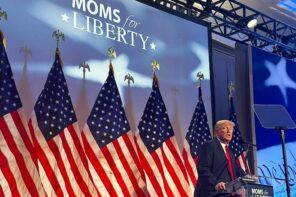With Rick Perry and Michele Bachmann at the top of the list of Republican presidential hopefuls, “dominionism” has garnered a good bit of media attention—Michelle Goldberg’s piece “A Christian Plot for Domination?” at the Daily Beast, Ryan Lizza’s piece “The Transformation of Michele Bachmann” at The New Yorker, and a piece at the Texas Observer, “Rick Perry’s Army of God,” by Forrest Wilder.
The increase in coverage of the religious right’s longterm strategy to transform American culture has led to a number of responses charging “leftists” with fearmongering and with generalizing from a few obscure examples to the wide-ranging religiously oriented conservatives. Michael Gerson writes about what he calls “An unholy war on the Tea Party” at the Washington Post:
So it becomes necessary to stretch the case a bit. Perry admittedly doesn’t attend a Dominionist church or make Dominionist arguments, but he once allowed himself to be prayed for by some suspicious characters. Bachmann once attended a school that had a law review that said some disturbing things. She assisted a professor who once spoke at a convention that included some alarming people.
Granted some of the coverage generalizes inappropriately, and much of it shows a lack of real understanding about the teachings of Reconstructionists, theonomists or (the new catchphrase) “dominionists.” But Perry has done much more than “once allowing himself to be prayed for,” and Bachmann didn’t just “once” attend that school. She still establishes her credentials based on her work there. Her mentor didn’t “once” speak at a Reconstructionist conference, he’s a regular integral part of their work. And as Sarah Posner showed in her piece on Oral Roberts University, Bachmann was steeped in the teaching that American law has a biblical foundation. Gerson distorts the situation as much as those he is criticizing.
Other coverage shows real sophistication, grappling with what I argue is an import theme in American religion. Here at RD we have been covering the work of dominion oriented religion for some time, and recently (in an article in Salon) Sarah helpfully explained what some of what the dismissers are missing.
Part of the problem in the current conversation is that writers new to the topic are thinking a bit too one-dimensionally. I get calls from reporters who ask: Is Michele Bachmann (or fill in any other name) a Reconstructionist? And as Gerson noted in his essay, the number of people who can be labeled in this way would “fit in a phone booth.” (Actually there are significantly more than he recognizes, but I take his point.) My point, though, is that this is the wrong question.
Far more interesting, I think, is to look at the influence of Christian Reconstruction; how has it impacted the style of the conservative Christianity that makes up the religious right—which is not to say that if I can show influence that that means that the leaders of the religious right really embrace every aspect of it.
Clearly we all seek to shape society along lines we think is best. Reconstructionists themselves hold a view of knowledge that says that there are really only two possible worldviews (a biblical one and a humanist one that comes in several varieties) and that both worldview are in a conflict for dominion (so in their view “we” are fighting for it too).
Its not that Rushdoony’s views of the biblical punishment for homosexuality have become widely accepted. The real influence is much more subtle: it’s in the now-multiple generations who have grown up in Christian schooling and Christian home schooling for which he laid philosophical, theological and legal foundations—Bachmann’s legal education is but one example of that. The influence plays out in the many Americans who see history and science as theology, promoting “Christian American history” and opposing evolution as an explanation for human origins.
Granted Americans have always had a sense of themselves as what Ernest Lee Tuveson called A Redeemer Nation, but David Barton invokes that telos in a much more literal way than those before him.
And it was shocking when, in 1980, Ronald Reagan said he supported teaching what he understood to be the biblical account of creation alongside evolution in schools. Today all of the viable candidates for the Republican nomination hold this view.
These broad cultural changes have developed, in part, from a longterm strategy adopted by the Reconstructionists (what Doug Phillips calls multigenerational faithfulness), the most important component of which is the education of children (theirs and insofar as is practical other peoples’ as well).
It is not fearmongering, paranoia, or religious bigotry to try to understand their goals and strategies. In fact, it’s irresponsible not to.




